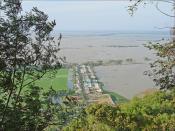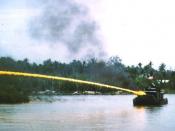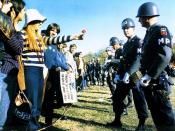The Vietnam War
One of the most remembered aspects of the Vietnam War era was student and campus unrest. Student activist played a key role in bringing antiwar ideas to the broader public. Before the Vietnam War Americans held politicians and congressmen in a high regard. Many people had formed their opinions about the war and what the United States intentions were. Some thought that the United States had good intentions about getting involved then they felt that the U.S. involvement was becoming a burden socially and economically they also believed that the United States needed to pull out of Vietnam. The other group of people thought that we should not leave Vietnam until the United States job was complete. A draft was instituted for the first time during the Vietnam War, men and women from the Baby Boom era were eligible to be sent out for war which Americans questioned the United States involvement to begin with.
College students were an exception to the draft, therefore they communicated to the Congressmen by protesting. The college students knew that when they graduated that they be would be eligible to be included in the draft at that time, many of the protest took place on the college campuses. This gave the students the incentive to protest and try to put a stop to the war. As the students protested it mirrored the feelings of many Americans and the lack of public support made the situation worse. (University of Miami, n.d.)
The youth that were dying in the line of fire began demanding answers to why the United States had such a high presence in Vietnam. Not only did they want to know what they were fighting for, they wanted to know why the organized peace talks kept falling through. The Students for a Democratic Society (SDS) held rallies and marches that began a movement by other anti-war activist and celebrities. The GI's that were stationed in Vietnam begun to go along with anti-war movements, and they began to wear peace signs and refused to obey their leaders. In 1967, America began to have its own problems on the home front. Americans faced riots, rallies and civil unrest. The people of America turned against the military, especially when the troops came home, the people no longer respected the solders. The death of Martin Luther King and Robert Kennedy sparked racial tension and more civil unrest. ("The Vietnam War Protest,"2011)
At Kent State, briefly, there were a group of students who were actively protesting the American invasion of Cambodia, seen as President Nixon's illegal escalation of the War. This bombing was announced on April 30, 1968, and the protests became active between Friday and Monday, May 1-4. On Friday there were about 500 protestors, widespread anger, and at midnight many students left the bars and began to throw bottles and break shop windows, etc. On Saturday, fearing escalation, Kent's Mayor declared a state of emergency and requested the National Guard to maintain order - and by Sunday there were 1,000 Guardsmen on campus. The college and town administration reacted badly to the idea of protest, but the addition of a military presence made the situation even more volatile, and many students joined the protests simply to prove that they had the right to demonstrate. A Monday, noon, mass protest was scheduled, during which about 2500 people gathered in the center of the Campus. However, the US Court of Appeals had ruled that the Guard had the legal right to disperse the crowd, the crowd refused, the Guard used tear gas, students began getting violent and throwing rocks and shouting, "Pigs off campus." Within a small amount of time, it became clear that the crowds would not disperse and the situation deteriorated into shooting and bayoneting, culminating in four deaths, and nine injuries among the protesters, as well as minor injuries to Guardsmen (Michener, 1982).
Thus, it can be reasonably argued that the seriousness of the activities at Kent State had major consequences to American foreign policy, society, and even the very fabric of the way middle-America viewed the war. It forced the National Guard to reexamine crowd control, the FBI to examine its role in domestic surveillance, and, as an outgrowth, a greater desire to see peaceful change and a more forceful view of students and middle-class Americans protesting the Vietnam war. Politically and socially, the end of the War had numerous consequences domestically and internationally. The United States did lose face internationally as the world power who could never lose a war, some thought it was an invitation for Communism to spread; but it also showed that there was social power within the masses, and that the changes brought about during the 1960s would forever change the way Americans thought about themselves, and the world. The very idea, for Vietnam Veterans, to come home to less than enthusiastic welcomes rattled the very fabric of young men wanting to serve in the military - and what many saw in SE Asia continues to affect them, even today. After Vietnam, America was not the same place; there was, and partially because of the Nixon Watergate scandal, a mistrust of the Presidency, and of elected officials in general. Even the military experienced doubt about its tactics, but was clear that a war should be fought militarily rather than politically. And, it must not be forgotten, there was a huge fiscal cost to the war, $120 billion (over $700 billion in adjusted dollars) resulting in a large budget deficit. This demonstrated that even a superpower had limited resources, and most importantly, political and social backing are necessary to win a war, not just military might (Wright, 1995).
References:
University of Miami. (n.d.). The Sixties- Student Unrest. Retrieved on May 25, 2012 from http://scholar.library.miami.edu/sixties/studentUnrest.php
Sitikoff, H. (1999). The Postwar Impact of Vietnam . Retrieved on May 25, 2012 from http://www.english.illinois.edu/maps/vietnam/postwar.htm
The Vietnam War Protest. (2011). Retrieved on May 25, 2011from http://www.essortment.com/vietnam-war-protests-21614.html
Wright, David, (1995), The Vietnam War: Causes and Consequences, Evans Bros.
Michener, James, (1982), Kent State: What Happened and Why, Fawcett.


